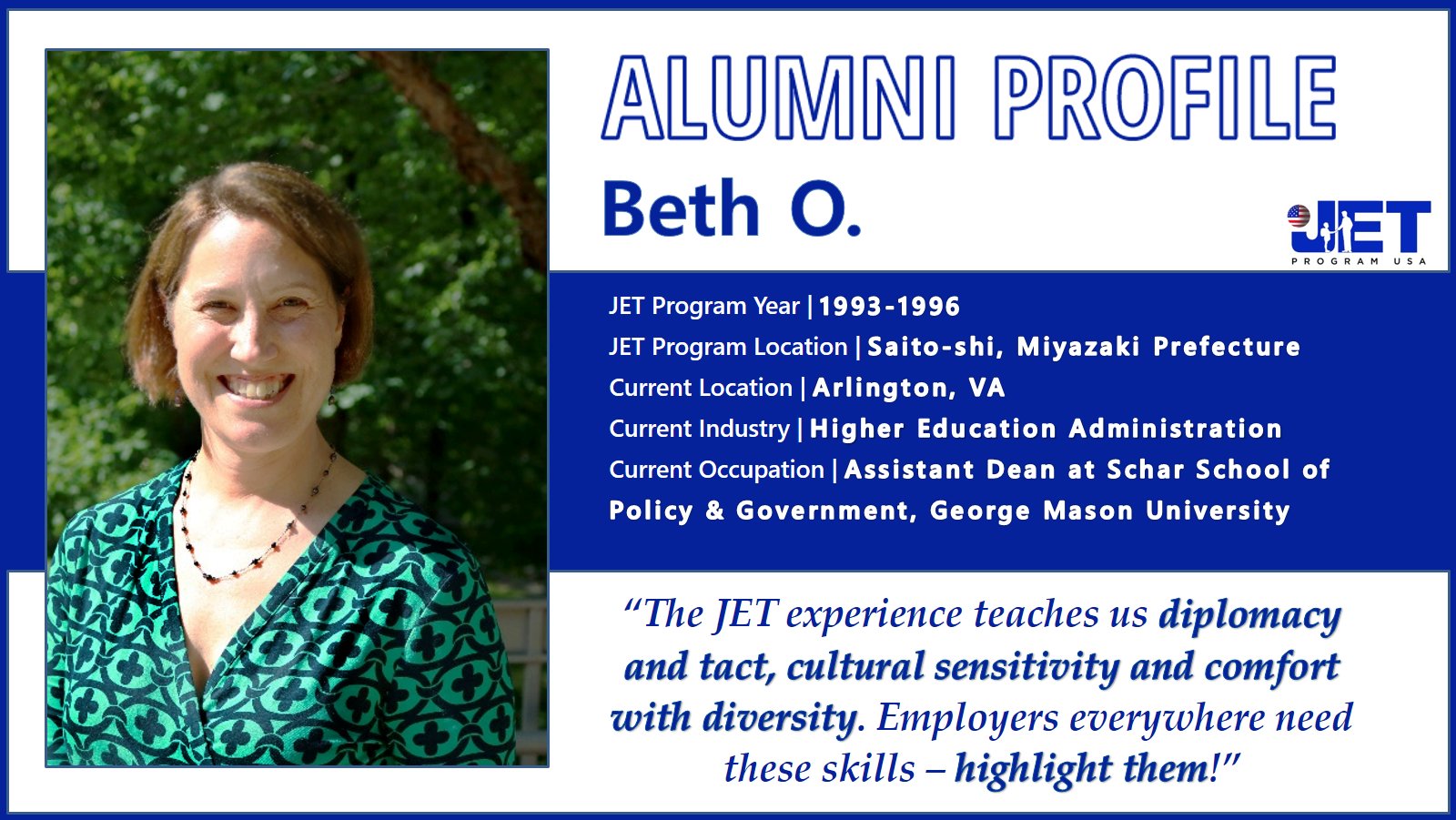
An interview with Beth, a 1993-1996 JET Program CIR who was placed in Saito city, in Miyazaki prefecture. She now works as the Assistant Dean of the Schar School of Policy & Government at George Mason University.
Tell us a little bit about your current work.
George Mason University (GMU), founded in 1972, has grown from a local commuter school to the largest public research university in Virginia. GMU is comprised of over 37,000 from over 130 different countries. The Schar School of Policy and Government prepares students to be leaders who advance the public good, be they in government service, the private sector, or in academia. I lead the administration of our three doctoral programs (biodefense, political science, public policy) and faculty research initiatives. I match doctoral students with research assistant opportunities, identify external funding sources to support faculty research, and collaborate with faculty on curricular and programmatic changes.
How did you end up at your current position?
After JET, I studied anthropology at the School of Oriental and African Studies in London, seeing the discipline as the academic embodiment of cross-cultural exchange. My studies led me to pursue positions in international education, and I returned to the US as coordinator for international student orientations and programming at Georgetown University. From there, I shifted to study abroad advising, managing 28 programs in Africa and the Asia-Pacific region. I jumped at the opportunity to move from a university support office to an academic unit, and have been at Mason for 17 years. I’ve had the flexibility to reconfigure my job every few years to learn new things and contribute to the school in different ways, from student advising to course scheduling, employee hiring, and grant management.
How did JET prepare you for your current position?
First, JET prepared me to listen and learn, before jumping in with ideas for change. All my early attempts on JET to pitch new programs were met with skepticism, which helped me recognize I needed to develop relationships and build trust before becoming innovative. Working on JET also taught me how to be comfortable with ambiguity, to be in a room not quite aware of all the dynamics at play…and to be able to figure it out. I am surprised that many people don’t have these skills, and they are critical to succeed in my position.
What advice would you give to JET participants or future JET applicants when it comes to establishing a career after JET?
Speakers at the JET 30th anniversary celebration reminded me of the responsibility we all have to highlight our JET experience for what it is – the largest public diplomacy program in the world, not just “teaching English.” The JET experience teaches us diplomacy and tact, cultural sensitivity and comfort with diversity. Employers everywhere need these skills – highlight them!
What was your most memorable JET Program experience?
It’s pretty difficult to choose! On the fun side, I founded a theatre company along with a friend from one of my community English conversation classes. We produced two shows in Japanese, one of them, A Midsummer Night’s Dream. The mechanicals performed their play-within-a-play in Miyazaki-ben (the local dialect), even integrating some local dance moves into the action, to the audience’s delight. The other strong memory is of the good friendships forged which continue over LINE and nengajyo (new year’s greeting cards). When I came down with the flu while at a regional conference, two friends picked me up from the airport, took my keys, and checked in on me in shifts, bringing food and TLC until my fever broke. I continue to smile at the thought of their kindness and care, and am so grateful they are still part of my life, though an ocean apart.
